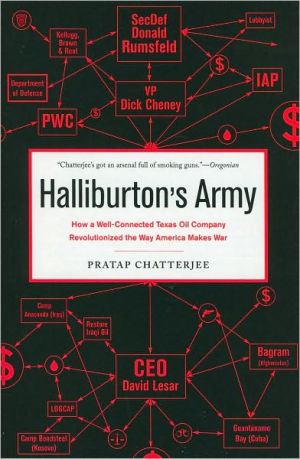Halliburton's Army: How a Well-Connected Texas Oil Company Revolutionized the Way America Makes War
From Halliburton's mission as the logistical backbone of the U.S. occupation in Iraq- without it there could be no war or occupation-to its role in covering up sexual abuse among its personnel in Baghdad, Halliburton's Army is a devastating exposé of corporate malfeasance and political cronyism.\ Pratap Chatterjee-one of the world's leading authorities on corporate crime-travels to Afghanistan, Kuwait, Iraq, Turkey, Uzbekistan, and former Yugoslavia to describe firsthand the freewheeling ways...
Search in google:
The first book-length exposé of the military contractor whose name has become synonymous with corruption and war profiteering. Publishers Weekly Chatterjee (Iraq Inc.) delves into the nebulous world of the Houston-based Halliburton corporation, tracing the company to its roots, when a fortuitous meeting with a young Lyndon Baines Johnson propelled the Brown and Root Company (which later merged with Halliburton) into Washington power politics. The author details the military contracting that largely funded the company through WWII and into the present-day war in Iraq, intertwining the company's history with the biographies of Dick Cheney, Donald Rumsfeld and other officials in the Bush administration. Chatterjee provides a laundry list of abuses for which the company has been investigated, including inflated billing of the Pentagon, providing unsafe living conditions for U.S. soldiers, labor exploitation and coverups to avoid congressional inquiry. He concludes with a look at the whistleblowers that brought these scandals into the public eye and the repercussions of the eventual congressional investigation. Chatterjee keeps the pace of the narrative at a quick clip and nimbly marshals his extensive evidence to reveal-without sanctimony or stridency-Halliburton's record of corruption, political manipulation and human rights abuses. (Feb.)Copyright © Reed Business Information, a division of Reed Elsevier Inc. All rights reserved.
Introduction A Revolution in Military Affairs1 Riding the Catfish to Anaconda 32 Early Days of Brown & Root 153 Brothers in Arms: Dick Cheney and Donald Rumsfeld 224 Cheney at the Helm 415 The Birth of LOGCAP 516 Supporting the War on Terror 697 Operation Restore Iraqi Oil(RIO) 808 Corruption in Kuwait 1099 Camp Anaconda 13910 Keep on Truckin' 15811 The Whistle-blowers 18112 Investigation and Punishment 198Conclusion: Revisiting the Revolution in Military Affairs 212Notes 225Acknowledgments 263Index 269
\ Publishers WeeklyChatterjee (Iraq Inc.) delves into the nebulous world of the Houston-based Halliburton corporation, tracing the company to its roots, when a fortuitous meeting with a young Lyndon Baines Johnson propelled the Brown and Root Company (which later merged with Halliburton) into Washington power politics. The author details the military contracting that largely funded the company through WWII and into the present-day war in Iraq, intertwining the company's history with the biographies of Dick Cheney, Donald Rumsfeld and other officials in the Bush administration. Chatterjee provides a laundry list of abuses for which the company has been investigated, including inflated billing of the Pentagon, providing unsafe living conditions for U.S. soldiers, labor exploitation and coverups to avoid congressional inquiry. He concludes with a look at the whistleblowers that brought these scandals into the public eye and the repercussions of the eventual congressional investigation. Chatterjee keeps the pace of the narrative at a quick clip and nimbly marshals his extensive evidence to reveal-without sanctimony or stridency-Halliburton's record of corruption, political manipulation and human rights abuses. (Feb.)\ Copyright © Reed Business Information, a division of Reed Elsevier Inc. All rights reserved.\ \ \ \ \ Library JournalBrown & Root was a Texas construction company that generously supported Lyndon Johnson's first campaign for the House. Over the years, through political connections, it obtained lucrative government contracts, hitting it big in the Vietnam War. In the 1980s the military discovered the virtues of contracting out logistical support (transport, base construction, mess halls, etc.) for combat personnel, a system that worked well, both for this company, now a pervasive battlefield presence wherever American soldiers go in number, and for the military. Along the way, the company incorporated Halliburton and Kellogg, for instance, but its strategy didn't change: do whatever it takes to get and keep the business. Investigative journalist Chatterjee (Iraq, Inc.) chronicles a long and tangled line of influence, bribes, revolving-door hiring (both Cheney and Rumsfeld served as CEOs), no-bid contracts, exploitation, overcharges, and spotty but usually effective service. It's a lesson in how the military-industrial complex operates, and while Chatterjee tends to focus on the misdeeds (many), he admits that we simply could not project military power without the support contractors provide. Most libraries having substantial military or political collections will want to acquire this.\ —Edwin B. Burgess\ \ \ \ Kirkus ReviewsA sordid tale of politics and profiteering, courtesy of the Bush administration and a compliant military. The Halliburton Corporation, of which Dick Cheney was chief executive before becoming Bush's vice president, is estimated to have provided more than 720 million meals to American service personnel, driven 400 million miles of convoy missions and made many billions of dollars for its work as the Pentagon's principal subcontractor. This relationship was born when Cheney, as secretary of defense for George H.W. Bush, came up with a creative-accounting way to comply with a congressional mandate to trim the military budget and privatize a big chunk of the war machine. Whereas during the First Gulf War there was one civilian contractor for every 100 soldiers, writes investigative journalist Chatterjee (Iraq, Inc., 2004), the ratio is now nearly one to one. If Cheney's maneuvering sounds a little conflict-of-interest-laden, it seems to have bothered no one in Washington until late in the prosecution of the Iraq War. Said one Pentagon whistleblower of the tainted procurement process, no-bid contracting and billions of dollars lost (and billions more earned fraudulently through various schemes), "the interest of a corporation . . . not the interests of American soldiers or American taxpayers, seemed to be paramount." Chatterjee documents the malfeasance down to the penny; the book is data-rich and heavily footnoted, to the extent that it reads more like a treatise than a work of narrative journalism. Yet Chatterjee tells intriguing stories alongside the compendia of numbers, dates and names. He documents, without much commentary, some of the ironies that emerge in the Halliburton story, amongthem Cheney's machinations to keep Iran open for Halliburton business while loudly putting sanctions in place-and claiming that the Iran hanky-panky was legal because it was conducted "by a foreign-owned subsidiary based in the Cayman Islands."A report that deserves many readers, about matters that deserve many indictments. Author tour to New York, Los Angeles, San Francisco, Washington, D.C., Portland, Ore., Seattle\ \








